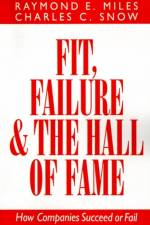av Charles C. Snow & Raymond E. Miles
251
Managers often become frustrated when, after making Herculean efforts to launch a better product, create a superior structure, or improve processes, success remains a distant and elusive goal. But genuine success does not come from any single action or any random group of actions caution Raymond Miles and Charles Snow in this incisive analysis of success and failure. Instead, they argue, success is achieved when the strategy, structure, and processes of a company "fit" together: operations then run smoothly inside and out, more is done with less, and customers are satisfied. Companies that go a step further to create exceptionally innovative strategy-structure-process packages for example, Carnegie Steel was the first to create a vertically integrated, centralized management structure within the steel industry often develop a record of accomplishments and reputation considerable enough to propel them into a mythical corporate Hall of Fame. Based on studies of dozens of companies to which they have applied this concept of "fit," the authors explain how success and failure can be predicted. Examining the causes of success and failure historically, they describe how such companies as General Motors and Sears, Roebuck both Hall of Fame candidates earned their legendary status by pioneering new forms of organization to fit the strategy-structure-process combination demanded by the marketplace at the time. Miles and Snow relate historic successes to current successes, explaining how even the most thriving companies of today including Wal-Mart, Rubbermaid, and General Electric could lose their way and become "misfit" companies. They describe in detail the path to misfit and what pitfalls to avoid to stay on the right track. Looking to the future, the authors examine new shapes organizations will take, including various types of "networks" and a promising new form that they call the "spherical" organization. Finally, Miles and Snow detail the key to long-term corporate health: dynamic fit. Dynamic fit allows managers to ensure flexibility and ongoing adaptation to the marketplace. Without it, the authors warn, success is fragile. With it, companies can develop their own recipe for success that works consistently no matter what corporate climate the future holds.

